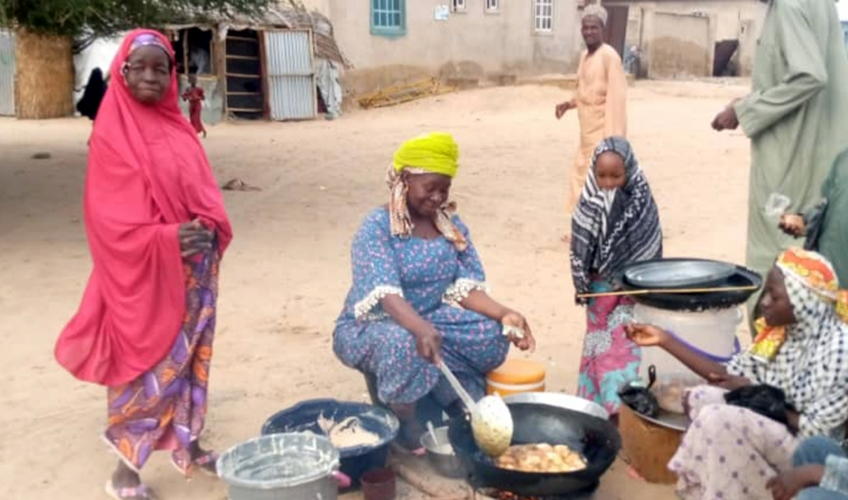Women remain integral to building trust and social cohesion
Hajja Kachallah is an influential community leader within the Shehu Masta internally displaced people (IDP) camp in Borno State, Nigeria, where she lives.

Vocal, tenacious and resilient, she champions the improved welfare of women and girls seeking refuge at the camp. This is evident at the welfare meetings with camp officials, where she always provides input and advice on power relations regarding camp management and how to improve the safety of women and girls. However, when camp security and safety meetings are held, Hajjah, like many other female community leaders, is often left out. In Borno State, the society is highly conservative and security matters are viewed as the purview of men, despite the victims of violent conflict often being women and girls.
Through the Zaman Lafiya Hakin Mu (Peace is our obligation) project, International Alert Nigeria began working with communities and the security sector institutions in Dikwa, Borno State, in 2019. This project initiated community safety partnerships (CSP), which provide a platform for dialogue and trust building to help foster social cohesion within the community.
To make the CSP sustainable, Alert leveraged the traditional leadership structures. Training with community leaders increased their ability to lead and facilitate dialogue sessions, and ensure a range of voices are represented in community and/or security related issues, Hajjah was one of the female camp leaders who was trained to facilitate the CSP dialogues.
“Initially I thought safety and security meetings had nothing to do with women,” says Hajjah.
As I started attending community safety partnership meetings I realised that the exclusion, marginalisation and underrepresentation of women in these meetings was why women’s safety and security concerns are not being addressed, as these are often not known to men as real concerns.
Part of the project was to help amplify the voices of women so that their concerns and opinions are heard, therefore Alert specifically created a women’s safety and security forum as an early warning, first-mile responder mechanism to address the gender gap in peace and security mechanisms within the community.
At this women-only forum and safe space, women discuss issues which affect their safety, peace and security in their immediate communities. The outcome of these discussions are then fed into the agenda of the community safety partnership meetings, where community leaders and security sector institutions meet to share information, deliberate on strategies to address and mediate on issues affecting the community. In one instance, women complained of sexual abuse and harassment when they stepped out of their tents at night to use the toilets. The path leading to the camp toilets are not lit with streetlights, which made the women feel vulnerable and not safe after dark.
“Most of our women and young girls in this camp are shy about discussing their security concerns with men – like the issue of attempted rape at the toilet areas, or the fear of assault from sleeping out in the open during the heat season.”
But the women’s safety and security forum has provided a platform for their voices; and as their representative, I provide them the assurance of confidentiality, which enables me to feedback their concerns to the community safety partnership forum.
As a member of both the women’s safety and security forum and the community safety partnership, Hajjah Kachallah presents the “asks” of the women from the camp to the partnership, with specific calls to action on how to address their needs. Hajjah, in one of the CSP meetings, presented the complaints of the women forum about insecurity around the camp toilets after dark. This led members of the CSP to propose the purchase of battery powered flashlights, to be distributed to women in the camp. Alert supported this idea with funds from its quick impact projects budget and has led to considerably lowering the incidences of sexual and gender-based violence.
About the project
The overall goal of Zaman Lafiya Hakin Mu is to improve the effectiveness of security responses and protection of civilians through enhanced trust and collaboration between civilians and security forces in Borno State, Nigeria. If community-based security stakeholders, particularly the police and civilians, are better coordinated, more inclusive and more accountable in their decision-making, then communities will be better able to manage security and conflict threats, thereby contributing to improved resilience, stabilisation and social cohesion.
The project targets Nigerian police, community members, local government and other security actors. Formal and informal security stakeholders are also engaged, including the military and civil defence corps, semi-formal vigilante groups like the Civilian Joint Task Force (CJTF), informal vigilante groups like the ‘Yan Banga’, and various community groups who conduct security functions.
The project target sites are Bama, Dikwa, Gwoza and Ngala with specific focus on IDP camps and host communities in selected project locations.
Supported by the Conflict, Security and Stability Fund (CSSF) of the Foreign, Commonwealth and Development Office of the UK Government, International Alert’s Public Safety and Security project, is working with communities and the security sector institutions particularly the Nigeria Police Force in Dikwa, Ngala, Bama and Gwoza LGAs, to improve police-public relations for effective community policing and social cohesion. The project also seeks to influence social behaviour towards women’s involvement in peace and security mechanisms, as supported by the Borno State Action Plan on the women, peace and security agenda of the United Nations Security Council Resolution 1325.




